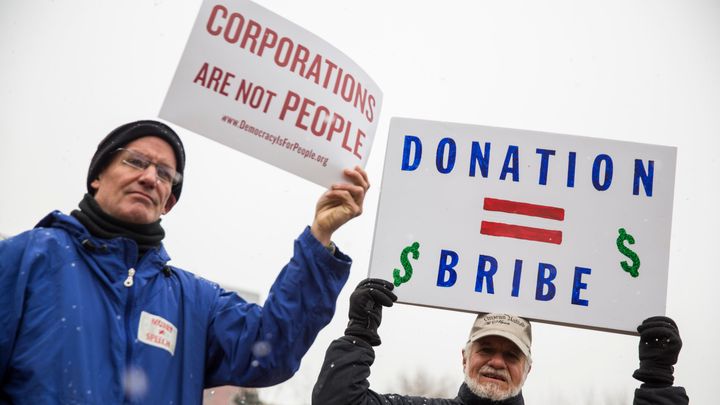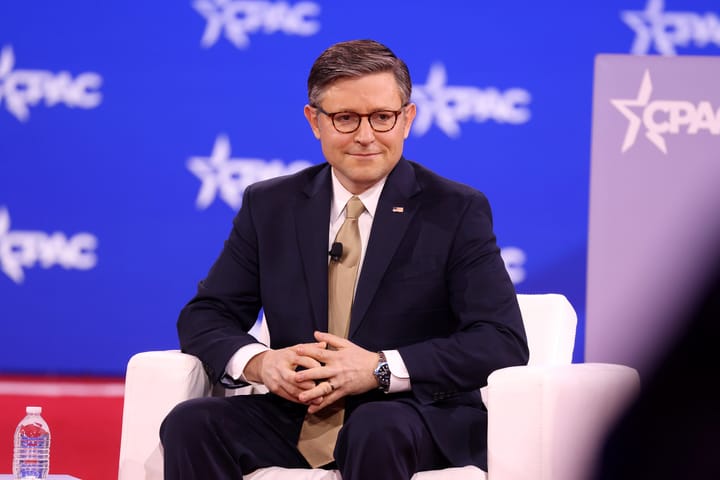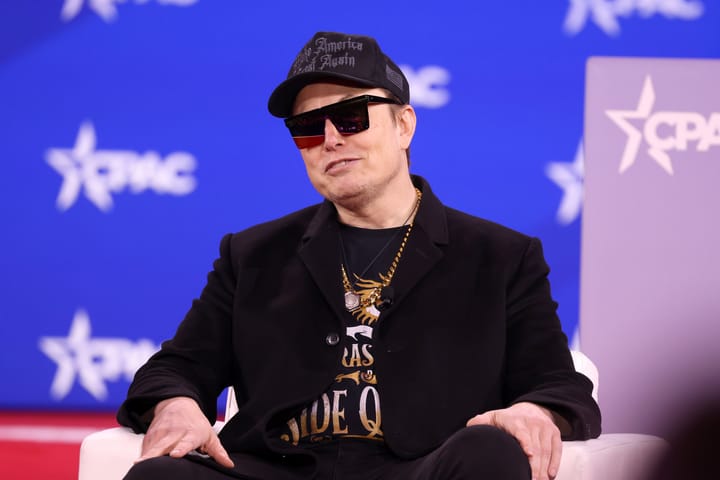Following Alexandria Ocasio-Cortez’s primary win last week, a political action committee aimed at ending “Big Money in politics” had a realization.
“Democrats should take the initial step of rejecting money from corporate PACs and removing the primary barrier to Americans trusting them,” End Citizens United said in a memo co-published with the Center for American Progress in the wake of the race results.
End Citizens United supported Ocasio-Cortez’s opponent, the powerful incumbent Democrat Rep. Joseph Crowley, despite his embrace of corporate funding. A Sludge analysis found that Crowley took $1.1 million from more than 250 corporate PACs this cycle. End Citizens United contributed $5,000 to Crowley’s campaign. Ocasio-Cortez, by contrast, rejected all corporate PAC money, but End Citizens United did not endorse her or contribute to her.
While Crowley’s defeat seems to have given the group inspiration on messaging, their memo does not say that they will withhold support for Democrats like Crowley who take most of their campaign funding from corporate PACs.
Asked by Sludge if they will stop endorsing and contributing to politicians who take money from corporate PACs, End Citizens United responded with a softer approach. “We encourage all of our endorsed candidates—and all Democrats—to reject corporate PAC money,” said Adam Bozzi, a spokesperson for the organization. “It’s both good policy and good politics.”
Founded in 2015 by three former digital fundraising specialists from the Democratic Congressional Campaign Committee, End Citizens United takes its name from the landmark 2010 Supreme Court ruling Citizens United v. Federal Elections Commission that gave corporations, nonprofits, and unions power to spend unlimited amounts of money on elections. The group says on its website that its mission is “to end Big Money in politics and fix our rigged political system by electing campaign finance reform champions.”
Other groups active in the fight against Big Money and the Citizens United ruling, like those that make up the Move to Amend coalition, work at the grassroots level to pass resolutions in cities and states addressing issues like corporate personhood. Others, like Brand New Congress and Justice Democrats, work to support a new generation of up-start politicians who pledge to reject all corporate PAC and lobbyist money during the campaign and, if elected, while serving in office.
End Citizens United taps into the same populist angst as these reform groups, and they have been wildly successful at using anti-corruption messaging to gain supporters and raise money. But they distinguish themselves by using a large part of their campaign contributions to re-elect corporate-financed Democratic incumbents.
Contributions to Corporate-Funded Incumbents
Despite advocating for Democrats to reject corporate money, End Citizens United hasn’t prioritized contributing to incumbents who make such pledges. Of the 12 Democrats in Congress who have pledged to stop rejecting corporate PAC money, End Citizens United has given to just three of them, according to data from the Federal Elections Commission. They have, however, endorsed several others incumbents who have pledged to reject corporate funding, but have not contributed to them.
A review of End Citizens United’s campaign contributions shows a group that funds to the mainstream of the Democratic congressional caucus and is particularly supportive of the the more conservative and corporate-friendly members of the party.
For example, End Citizens United has helped to finance members of the Blue Dog Coalition, a conservative group of Democrats that prioritize working across the aisle with Republicans and often side with corporate interests on issues like financial deregulation, tax policy, and defense spending. Of the 18 Blue Dog Democrats currently in the House, End Citizens United has contributed to nine of them. They have also contributed to 10 of the 14 candidates that the Blue Dog PAC has endorsed this year.
Blue Dog PAC Chair Kyrsten Sinema (D-Ariz.), who is running for the Senate in Arizona, is tied with Rep. Jacky Risen (D-Nev.) as the top recipient of End Citizens United money over the past two cycles. Sinema has distinguished herself by taking more money from the banking industry than any other Democrat in the House. PACs related to the finance, insurance and real estate sector have already given her a total of $613,000 this cycle. End Citizens United has chipped in the maximum of $10,000 to support her campaign in each of the past two cycles.
On the Senate side, of the 17 Democrats who broke with their party earlier this year to vote for a Wall Street-backed banking deregulation bill, End Citizens United has given to 10 of them, including the top six recipients of bank industry money among the group, according to campaign finance records.
Top members of the congressional Democratic leadership, including Minority Leader Nancy Pelosi (D-Calif.), Whip Steny Hoyer (D-Md.), Caucus Chair Joe Crowley (D-N.Y.), and DCC Chair Ben Lujan (D-N.M.), have each been endorsed by End Citizens United and received contributions from the group in the past two cycles. None of them are among the Democratic incumbents rejecting corporate PACs.
Hoyer was caught on tape earlier this year trying to pressure progressive Democrat Levi Tillerman to drop out of the Democratic primary race in Colorado’s 6th district, where the DCCC and was supporting a different candidate, corporate lawyer Jason Crow.
End Citizens United joined the DCCC in endorsing Crow and has contributed $11,373 to his campaign. Crow has worked for nearly a decade at Holland & Hart LLP, a law firm that lobbies for corporations like Comcast, Google, and Raytheon. He has received campaign contributions from employees of several prominent lobbying shops, including Arnold & Porter and Sidney Austin LLP. Crow recently defeated Tillerman in the primary.
Pelosi stuck up for Hoyer after the tape was released, saying, “I don’t see anything inappropriate in what Mr. Hoyer was engaged in.”
End Citizens United also makes large payments to Democratic party committees, like the DSCC and DCCC, the campaign arms of incumbent Democrats in Congress. Bozzi said in an email that those contributions are to support efforts by Democrats to take back the Senate in order to pass campaign-finance and transparency reform measures.
Other groups pushing for campaign finance reform take issue with their contributions to corporate-financed Democrats.
“If you’re a voter who wants to support candidates who fight against money in politics, on the surface, [End Citizens United] looks like an attractive option,” said Brand New Congress spokeswoman Cory Archibald. “Yet they are funneling these small-dollar contributions to candidates sitting on millions in corporate PAC money.”
“If their organization only supported candidates who firmly pledged no PAC money, their contributions could breathe much-needed life into grassroots campaigns. Instead it looks more like an intentional obfuscation,” Archibald said in an email.
End Citizens United does spend money to support candidates that reject corporate PACs. Bozzi explained that the group spent $117,000 on independent expenditures supporting Katie Porter in the Democratic primary in California’s 45th congressional district. Porter’s chief opponent in the race was Brian Forde, a former technology adviser in the Obama administration who made support for blockchain technology a key part of his campaign. More information on End Citizens United’s independent expenditures for and against candidates can be viewed at OpenSecrets.
The group also engages in state-level reform ballot initiatives, including those in South Dakota, Arizona, Missouri, North Dakota, and Massachusetts, and they are planning to move into statewide races later this year. They also say they have provided leadership on moving many candidates and the Democratic party generally in the direction of refusing corporate funding.
Aggressive Marketing
End Citizens United is good at raising money. Using tactics that look similar to those employed by the DCCC, the group has raised more than $44 million since 2015, much of it from small donors. Their website says they have more than 400,000 donors and their average donation size is $14.
According to FEC records, End Citizens United typically spends more than $100,000 each month on email list rentals from media outlets like Alternet, The Nation, and Mother Jones. Their most recent FEC filing shows that $720,000 of the $833,000 they spent during the month of May went to consultants, lead acquisition, polling, and general operating expenses, while $113,000 was contributed to political campaigns and party committees.
Their acquisition and fundraising programs are high-volume and aggressive. They typically send at least three emails per day, but sometimes they send six or more. Emails from End Citizens United received by the author in the past week came with subject lines like, “need 1 donation from [author’s zip code] to SAVE the Supreme Court” and “Give up. Go Home. TED CRUZ WINS.”
Other groups working on electing candidates who reject corporate PACs say End Citizens United’s tactics have negatively impacted their own efforts.
“When these emails are at their highest volume (leading up to a special election), our supporters have written to our Help Desk complaining about us asking for donations,” said Archibald. “These complaints cite the constant requests they get from campaigns like Ossoff and Lamb—in other words, campaigns associated with both the DCCC and ECU [End Citizens United].”
“Their tactics not only burn their list, they burn ours, too. Only we don’t have $18M to go out and buy more email lists or pay for advertising to attract new supporters,” Archibald added.
Not all money-in-politics groups have a negative view on End Citizens United. Adam Smith, communications director with Every Voice—a group that has received $50,000 from End Citizens United this cycle—says they have been a helpful ally.
“End Citizens United has become a great partner on money-in-politics reform issues,” Smith said in an email. “They have activated their membership base and raised money for state and local reform policy campaigns. Their work on the no corporate PAC money has been important in raising the profile of the issue this cycle, which helps build momentum for actual policy change.”



